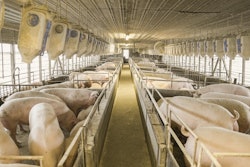
The U.S. farm bill, a sweeping law that provides funding for programs from crop insurance to food assistance, could run into a time crunch this year if lawmakers are unable to reach an spending agreement.
The American Farm Bureau Federation (AFBF) takes the position that baseline funding for the farm bill must increase this year, Joe Gilson, AFBF director of government affairs, said during the association's annual convention in January. The Farm Bureau and other industry groups would like lawmakers to raise the reference prices used to determine when federal financial assistance to farmers begins for key crops such as corn and soybeans to reflect rising commodity prices. They'd also like to see crop insurance expanded to cover a greater variety of crops, and to protect against risks such as geopolitical conflict and trade wars.
There's just one problem with all of their ambitions: the cost. Increasing reference prices would cost US$20 billion to US$50 billion, according to leading agricultural economists. And Congressional leaders have already agreed to cap spending this year as part of an agreement to avoid a government shutdown.
Given the current agreement, U.S. Secretary of Agriculture Tom Vilsack told industry leaders and press at the Farm Bureau convention that the Farm Bureau would have to “get creative” and look for opportunities for financing outside the farm bill.
Proposals floated so far involve cutting funds from other parts of the U.S. budget to offset increased spending on the farm bill. Potential areas suggested for cuts include the Inflation Reduction Act, a 2022 law funding renewable energy, large-scale infrastructure and conservation projects, to the farm bill, and government food assistance.
But Clark Ogilvie, special counsel to the Committee on Agriculture in the U.S. House of Representatives, warned that these conversations were basically non-starters for Democrats, whose votes will be needed to pass the farm bill.
“The only way you get a farm bill passed is you have to have everyone going in the same direction, to have everyone feel like they have a vested interest,” Ogilvie said during a panel on the farm bill at the AFBF convention in Salt Lake City. “If you start robbing Peter to pay Paul, Paul tends to get a little upset about that. ... If everyone is fighting for pie, it's hard to keep that coalition together.”
If the farm bill does not pass by late March, Gilson warned that industry advocates risk running into the election season, when many members of the U.S. House and Senate will return home to hit the campaign trail. At that point, Gilson said, Congress may opt to pass an extension bill instead of renewing the farm bill for a full five-year term.
And in the meantime, Vilsack said, the uncertainty has made long-term planning difficult for U.S. farmers — and for the U.S. Department of Agriculture, which does not know what its budget will look like mere months from now.
“Certainty is always a wonderful thing,” he said. “But we are dealing with a Congress that doesn't have a budget yet, which is quite consistent because it has been since 199[6] since we had a budget on time, and it creates real difficulties for the department.”














